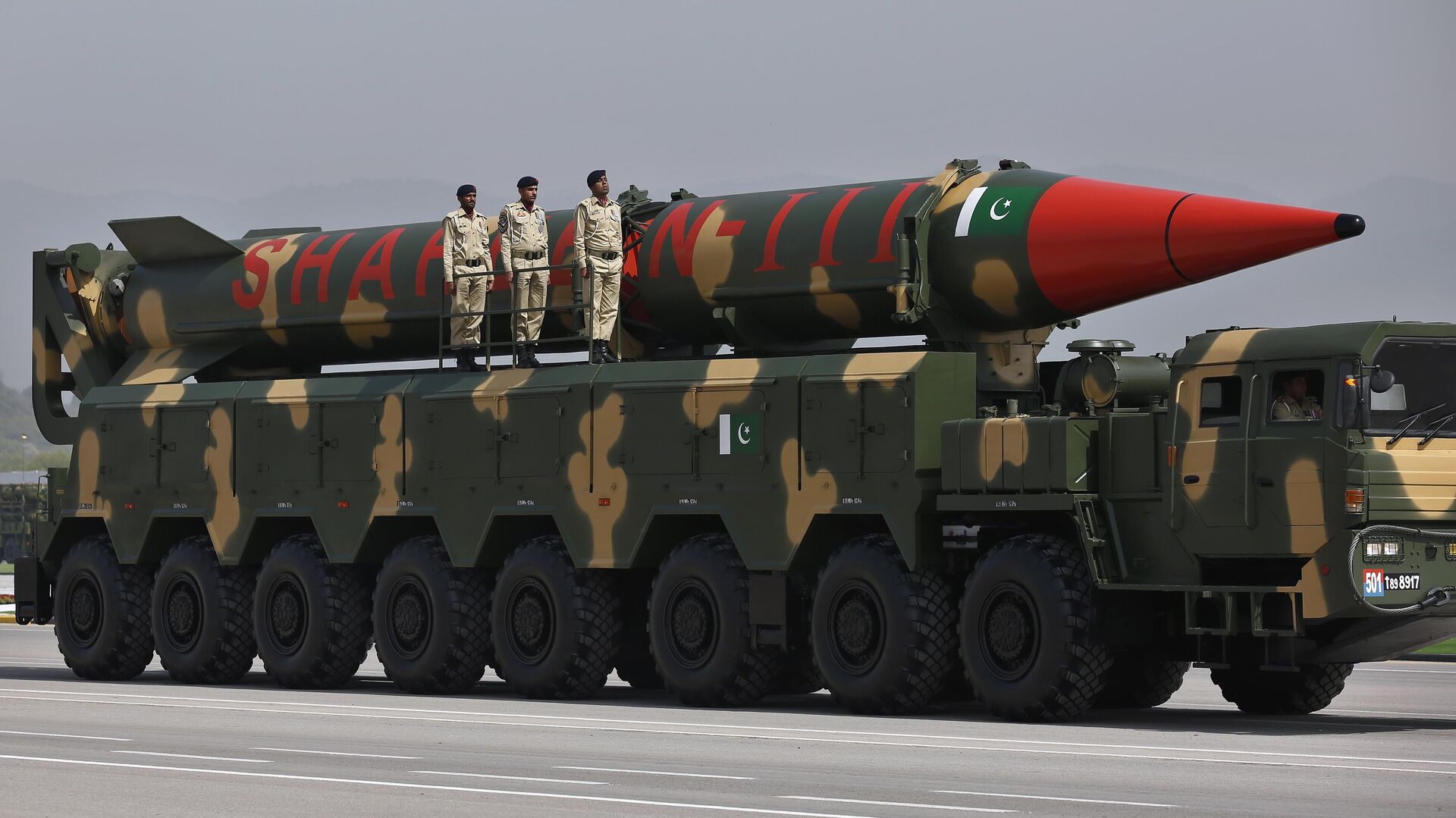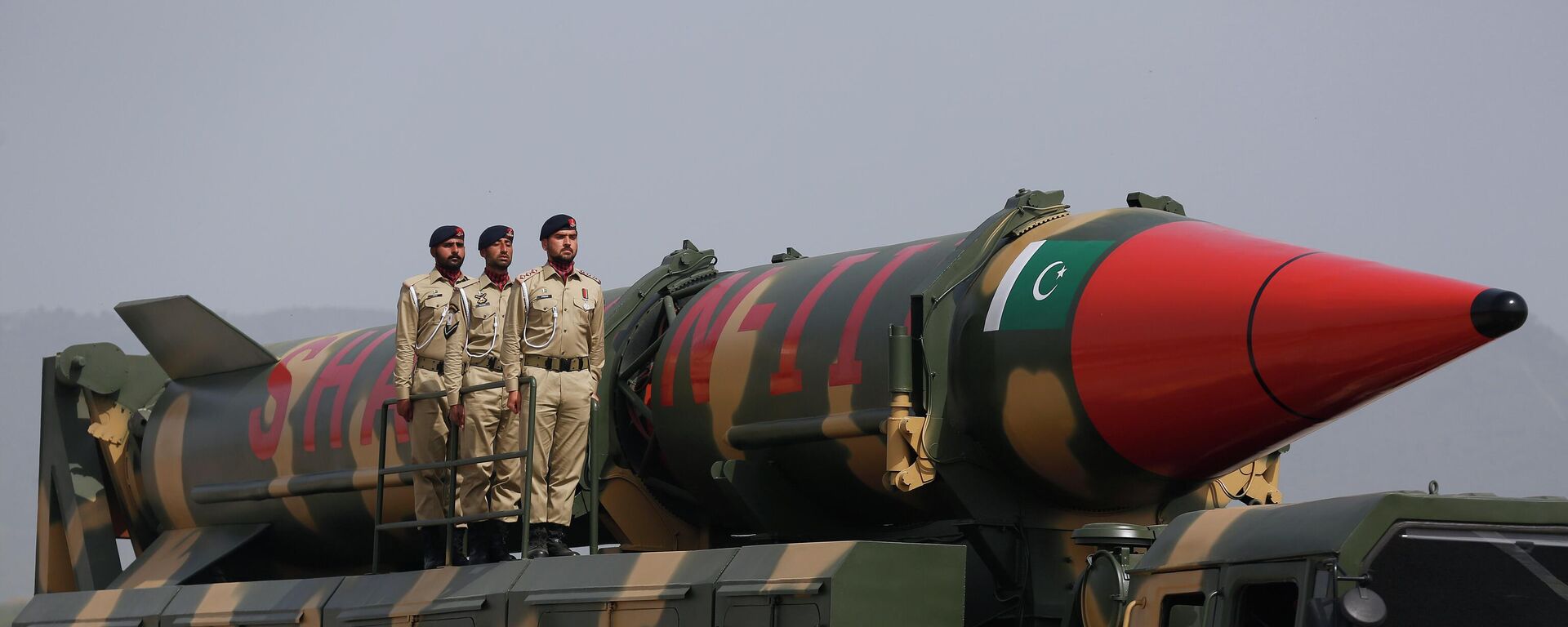https://sputniknews.in/20250113/are-pakistans-nuclear-assets-in-danger-after-abduction-of-atomic-industry-employees-8652445.html
Are Pakistan's Nuclear Assets in Danger After Abduction of Atomic Industry Employees?
Are Pakistan's Nuclear Assets in Danger After Abduction of Atomic Industry Employees?
Sputnik India
The abduction of 18 Pakistan Atomic Energy Commission (PAEC) workers last week has sparked a political debate about the safety of the industry. Sputnik India... 13.01.2025, Sputnik India
2025-01-13T20:29+0530
2025-01-13T20:29+0530
2025-01-15T11:42+0530
world news
pakistan
india
https://cdn1.img.sputniknews.in/img/07e6/0c/10/127208_0:34:3523:2015_1920x0_80_0_0_26b4575beacb6dcd4b5c334d360e9a92.jpg
Pakistan’s nuclear installations and strategic assets are well protected and in safe hands, former defence secretary and minister Lieutenant General Naeem Khalid Lodhi told Sputnik India, adding that the security of the industry is a well-known fact that has been acknowledged internationally numerous times.The protocols, procedures, and both negative and positive controls are all well-practiced and firmly established, he said.The recent abduction of 18 Pakistan Atomic Energy Commission mine worker – who Lodhi stated were engaged in a sensitive task - occurred far from any nuclear installation and was blamed by authorities on "terrorist" groups. The incident took place while the workers were traveling, indicating a serious security lapse, he emphasised.Nonetheless, even if raw, unprocessed material were to fall into someone else's hands, it would be of little value, the former defence minister said. The Pakistan PAEC workers' abduction poses neither a threat nor relevance to atomic proliferation, Pervez Amirali Hoodbhoy, a Pakistani nuclear physicist and former member of the United Nations Secretary General's advisory board on Disarmament, told Sputnik India.His thoughts were echoed by Dr Tahir Mahmood Azad, a nuclear security expert associated with the Department of Politics and International Relations. The recent abduction of the workers does not pose a direct threat to Pakistan’s nuclear facilities or indicate any attempt by terrorists to acquire enriched uranium, Azad told Sputnik India.Uranium exists in various forms, with U-238 being the most common. It requires scientific processing to convert it into plutonium-239, while U-235, which is essential for nuclear enhancement, is rare and difficult to obtain. Thus, acquiring highly enriched uranium for terrorist purposes is challenging, he explained.A US-based geopolitical expert on South Asia, Olivier Blarel, who is affiliated to the Carnegie Endowment for International Peace, doesn't believe that the abduction and potential theft of uranium ore pose a direct risk to Pakistan's nuclear assets. The real question is the ability of the Pakistani Armed Forces to secure the country amidst a rise in terrorist attacks from various militant groups, he said in an interview with Sputnik India.* Terrorist organisation banned in Russia and other countries.
https://sputniknews.in/20240619/what-drives-pakistans-growing-nuclear-arms-expenditure-7653776.html
pakistan
india
Sputnik India
feedback.hindi@sputniknews.com
+74956456601
MIA „Rossiya Segodnya“
2025
Muhammad Sharif
https://cdn1.img.sputniknews.in/img/07e7/0b/05/5257054_0:0:443:444_100x100_80_0_0_b8bd2af32be62a6eecdb4a84c7fd978f.jpg
Muhammad Sharif
https://cdn1.img.sputniknews.in/img/07e7/0b/05/5257054_0:0:443:444_100x100_80_0_0_b8bd2af32be62a6eecdb4a84c7fd978f.jpg
News
en_IN
Sputnik India
feedback.hindi@sputniknews.com
+74956456601
MIA „Rossiya Segodnya“
Sputnik India
feedback.hindi@sputniknews.com
+74956456601
MIA „Rossiya Segodnya“
Muhammad Sharif
https://cdn1.img.sputniknews.in/img/07e7/0b/05/5257054_0:0:443:444_100x100_80_0_0_b8bd2af32be62a6eecdb4a84c7fd978f.jpg
pakistan, india
Are Pakistan's Nuclear Assets in Danger After Abduction of Atomic Industry Employees?
20:29 13.01.2025 (Updated: 11:42 15.01.2025) The abduction of 18 Pakistan Atomic Energy Commission (PAEC) workers last week has sparked a political debate about the safety of the industry. Sputnik India analyses the potential implications of this incident.
Pakistan’s nuclear installations and strategic assets are well protected and in safe hands, former defence secretary and minister
Lieutenant General Naeem Khalid Lodhi told
Sputnik India, adding that the security of the industry is a well-known fact that has been acknowledged internationally numerous times.
The protocols, procedures, and both negative and positive controls are all well-practiced and firmly established, he said.
The recent abduction of 18 Pakistan Atomic Energy Commission mine worker – who Lodhi stated were engaged in a sensitive task - occurred far from any nuclear installation and was blamed by authorities on "terrorist" groups. The incident took place while the workers were traveling, indicating a serious security lapse, he emphasised.
Nonetheless, even if raw, unprocessed material were to fall into someone else's hands, it would be of little value, the former defence minister said.
"We are quite confident in Pakistan that we will soon overcome this current spike in terrorism, which is actually being abetted and funded by foreign agencies," Lodhi assured. "Our historical record of safety regarding all our nuclear installations and processing plants (including power plants) is remarkable, and we will diligently maintain that."
The Pakistan PAEC workers' abduction poses neither a threat nor relevance to atomic proliferation, Pervez Amirali Hoodbhoy, a Pakistani nuclear physicist and former member of the United Nations Secretary General's advisory board on Disarmament, told Sputnik India.
His thoughts were echoed by Dr Tahir Mahmood Azad, a nuclear security expert associated with the Department of Politics and International Relations. The recent abduction of the workers does not pose a direct threat to Pakistan’s nuclear facilities or indicate any attempt by terrorists to acquire enriched uranium, Azad told Sputnik India.
Uranium exists in various forms, with U-238 being the most common. It requires scientific processing to convert it into plutonium-239, while U-235, which is essential for nuclear enhancement, is rare and difficult to obtain. Thus, acquiring highly enriched uranium for terrorist purposes is challenging, he explained.
"However, the abduction has significant psychological implications on a global scale, potentially increasing pressure on Pakistan. Given the country's existing geopolitical challenges, such incidents could damage its international reputation, which adversaries may exploit," the expert expressed. "Despite these pressing issues, the Pakistani government appears focused on targeting the Pakistan Tehreek-e-Insaf (PTI) party."
A US-based geopolitical expert on South Asia, Olivier Blarel, who is affiliated to the Carnegie Endowment for International Peace, doesn't believe that the abduction and potential theft of uranium ore pose a direct risk to Pakistan's nuclear assets. The real question is the ability of the Pakistani Armed Forces to secure the country amidst a rise in terrorist attacks from various militant groups, he said in an interview with Sputnik India.
"So far, the Tehrik-e-Taliban Pakistan (TTP*) has targeted the military and their families, launching indiscriminate attacks on civilians. This targeted approach represents a new pattern and exposes the weaknesses of the security forces in countering TTP attacks. This was likely the attackers' goal: to highlight the inability of Pakistan's security forces to protect key national assets and to create a sense of vulnerability," he summed up.
* Terrorist organisation banned in Russia and other countries.



